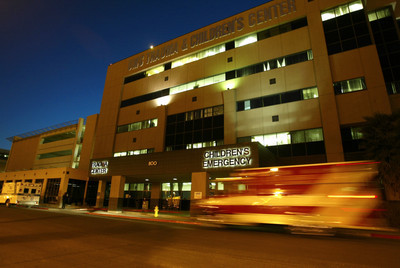UMC chief to propose discount structure for uninsured county residents
Uninsured Clark County residents not eligible for state or federal health care assistance soon might get significant discounts for care they receive at University Medical Center and its Quick Care centers.
Interim Chief Executive Officer Kathy Silver today will submit a proposal to the Clark County Commission that could lower patient bills by as much as 70 percent for inpatient services such as cardiovascular surgery and baby deliveries. Charges for outpatient care, such as that provided at a UMC Quick Care center, could drop by 50 percent under a new rate structure being proposed by UMC administrators.
The new rates and charges, which could take affect as early as Nov. 1, would be based on a resident's ability to pay using a sliding scale and the Federal Poverty Level Guidelines, Silver said Monday. For example, an individual who earns 200 percent of the federal poverty level -- $20,420 per year -- would have to pay only about $464 for an MRI as opposed to the $1,160 that would be billed to an uninsured patient who doesn't meet the financial threshold for a discount.
"The problem the uninsured face is that they don't get the benefit of contracted rates,'' said George Stevens, the county's chief financial officer, referring to hospital rates established through contractual agreements with third party payers such as Medicare or Medicaid.
"The average citizen who earns $30,000 to $50,000 a year who ends up in the trauma center but doesn't have health insurance, the bill you're going to get is going to be so astronomical that you're never going to be able to pay it. ... What we're trying to do is to have more of a reasonable rate structure in place for our uninsured patients or self-paying patients.''
UMC has offered lower rates and discounts to Clark County residents in the past, Silver said. However, those discounts did not cover outpatient and Quick Care services.
The new plan would be more along the line of what is negotiated between managed care plans such as Medicaid, Medicare and private health insurance companies, Silver said.
For example, in the past, Clark County uninsured residents who received a 2 percent discount on a $12,000 outpatient procedure at UMC would end up paying $11,700. Although these patients are getting a discount, "that's still pricey for the average citizen without (health) insurance," Silver said.
The majority of UMC's patients are eligible for some form of medical coverage, but some have no coverage and end up with large medical bills they can't pay. Often times, when individuals encounter the $40,000 to $50,000 medical bill, Silver said, they don't make an effort to pay it because they don't think they can.
"We're trying to target folks who are employed, but their employers do not provide health insurance,'' she said. "What we'd rather see is people using the Quick Cares more frequently by making it more affordable so that they don't access the emergency room, which is more expensive.''
Hospital administrators are proposing that, to receive a discount at a UMC Quick Care, a patient would provide a deposit. If the bill is paid within 30 days, the patient would be given the 50 percent discount, Silver said.
Hospital officials said they have learned about similar payment structures at other nonprofit hospitals throughout the country. The goal is to give patients a target that they can achieve which, in the long run, could save UMC money.
In most cases, when individuals don't pay, UMC seeks payment through a collection agency. When that doesn't work, the hospital ends up eating the costs.
"We hope it will improve cash flow and bad debt,'' Silver said.
In addition to this new payment structure, the commission, which acts as the hospital's Board of Trustees, also will receive a report from Stevens on the public medical facility's first-quarter finances.
Though the hospital is on track to do better financially than last fiscal year, Stevens said UMC is still showing "some pretty significant losses.''
"Pretty significant" means about $10 million in net losses so far this fiscal year.
For the first quarter, Stevens said UMC is not doing as well as expected.
He said the hospital's cash receipts are up from last year, but patient volumes are down.
"Our economy is not very good right now, and 45 percent of Clark County's revenue is tied to sales tax,'' Stevens said.
"When the economy is bad, our largest source of revenue is going to be down" and social services are hit hardest.
Contact reporter Annette Wells at awells@reviewjournal.com or (702) 383-0283.

















